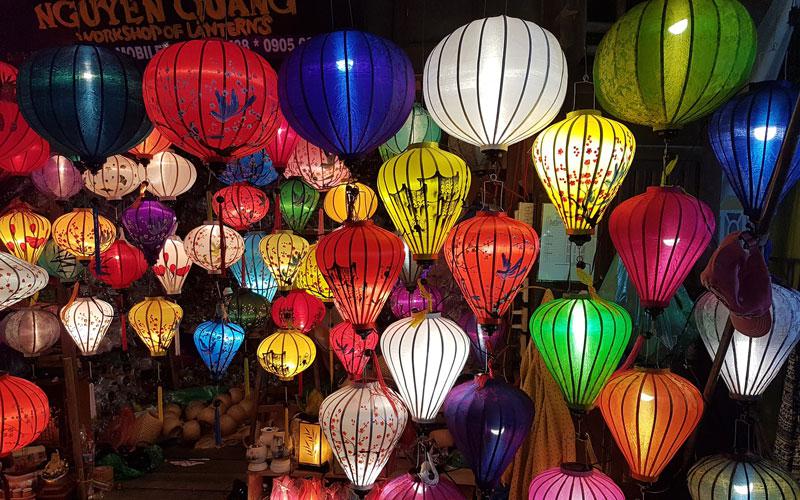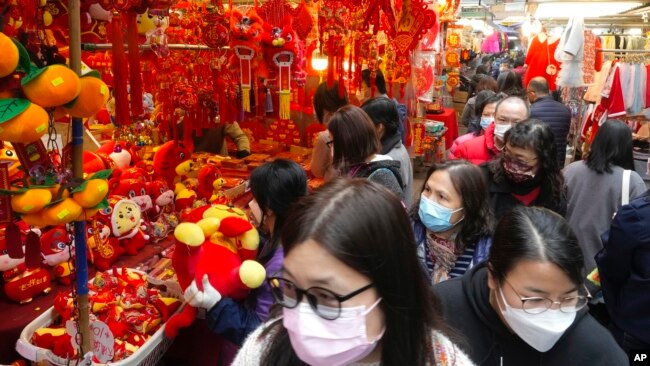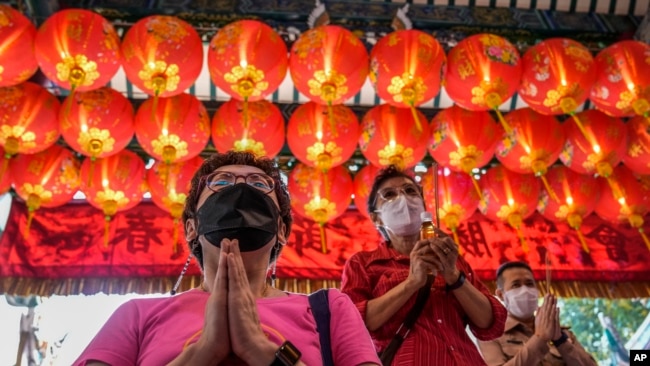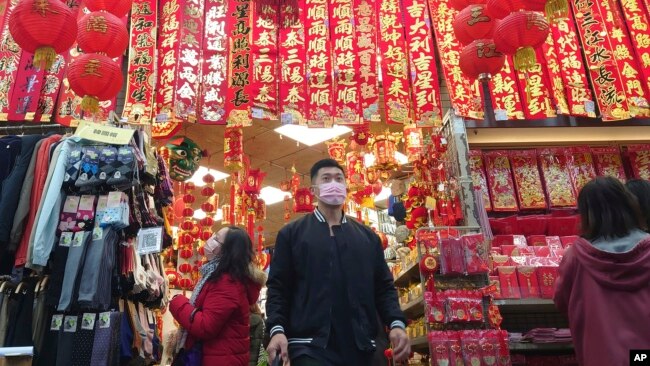アジアの旧正月
今朝、2月1日、ちょうど新年のお祝いメッサージを台湾の台北と高尾の友人に送ったところです。
台北の友人宅では、1月31日大晦日、小規模の家族内で夕食を囲んだそうです。旧正月当日は、父方の大家族が集まって、皆赤い服を着てお祝いすると言っていました。絶対赤い服着用だそうですよ!!
台湾の高尾に住む別の友人との旅行を思い出します。街角ではお正月に戸口に飾る赤い大きなお札があり、一年中そのままだと説明してくれました。
日本では消えてしまった旧正月。
日本の静かなお正月とは違い、アジアでは賑やかにお祝いします!!
VOAで英語をまなび、アジアのお正月を見てみましょう!!
パンデミック規制下でアジア人が今年も旧正月を祝う(和訳)
Asians Celebrate Another Lunar New Year under Pandemic Restrictions
January 31, 2022
アジア諸国の人々は月曜日、COVID-19の流行に関連した制限のもと、今年も旧正月を祝う準備をしました。
旧正月は2月1日(火)にやってきます。それは中国で最も重要な祝日です。毎年、中国の伝統的な干支である十二支にちなんで名づけられます。今年は、2022年、寅年。
この祝日は、歴史的に見ても、毎年世界最大の人の移動が行われます。パンデミック以前は、数億人の中国人が旧正月休みに帰省していました。その多くは都市で働く労働者で、故郷の村に帰省します。
しかし、COVID-19の大流行中に人々が休暇を祝うのは3年連続となります。2020年、中国当局は旧正月のわずか2日前に中国の武漢で監禁を命じました。武漢は、新型コロナウイルスの最初の感染者が発見された中心都市です。
現在、中国人の約85%が完全な予防接種を受けていると、オンライン調査サイトOur World in Dataが報告しています。このため、政府が警告を発しているにもかかわらず、今年は中国国内を旅行する人が増えています。今年は、多くの中国人が自宅でお祝いをするために伝統的な用品を購入していました。
1月17日から始まった旧正月の休暇シーズンの最初の10日間に中国国内を旅行した人は約2億6千万人でした。これは、パンデミック前よりは少ないですが、昨年よりは46%増加しています。全体では、休暇期間中に12億回の旅行が行われ、2021年から36%増加すると政府は予想しています。
北京に住む63歳の定年退職者、Huang Pingさんは花市場で買い物をしながらAP通信の取材に応じまし。彼は、COVID-19の規制により宗教施設や祭りが閉鎖され、新年の雰囲気は薄れたと思っていると語っていました。
しかしHuangさんは、新年にはより良い時代が来ることを望んでいると言っています。「一日も早く(パンデミックが)過ぎ去り、経済も回復するようにと願っている」と語っています。
Asians Celebrate Another Lunar New Year under Pandemic Restrictions
People across Asia prepared Monday to celebrate another Lunar New Year under restrictions related to the COVID-19 pandemic.
The Lunar New Year falls on Tuesday, February 1. It is the most important holiday in China. Each year it is named after one of twelve signs of the country’s traditional zodiac system. This year, 2022, is the Year of the Tiger.
The holiday historically marks the world’s largest yearly movement of people. Before the pandemic, hundreds of millions of Chinese traveled home for Lunar New Year break. Many of them are workers in cities who go back to their home villages.
But it will be the third straight year that people celebrate the holiday during the COVID-19 pandemic. In 2020, Chinese officials ordered a lockdown in Wuhan, China, just two days before Lunar New Year. Wuhan is the central city where the first cases of the new coronavirus were discovered.
Currently, about 85 percent of Chinese are fully vaccinated, the online research website Our World in Data reports. This has led to more people traveling within China this year, even though the government has issued warnings against it. This year, many Chinese were buying traditional supplies to celebrate at home.
About 260 million people traveled in China during the first 10 days of the Lunar New Year holiday season that started January 17. That is fewer than before the pandemic, but up 46 percent over last year. Overall, the government estimates 1.2 billion trips will be made during the holiday period, up 36 percent from 2021.
A 63-year-old retiree from Beijing, Huang Ping, spoke to The Associated Press while shopping at a flower market. He said he thinks the New Year’s “atmosphere has faded” with the closure of religious centers and festivals because of COVID-19 restrictions.
But Huang said he hoped for better times in the new year. “I wish for the (pandemic) to pass as early as possible and for the economy to recover as well,” he said.
Another Chinese retiree, 62-year-old Han Guiha, told the AP he was planning on making the best of the situation. “I'll stay at home enjoying good food and wine,” Han said. “I will make my house clean and beautiful. Right now, the virus is spreading and we need to be careful.”
Chen Lianshan is a Beijing University expert on Chinese folklore. He said that with the Year of the Tiger, many people are hoping the traditional powers linked to the animal will help put the country on a path out of the pandemic. The tiger represents “a protection against evil spirits and it can defeat demons and ghosts of all kinds…” Chen said.
Elsewhere in Asia, there were signs that some celebrations might not be as restricted as last year. In many nations, most people are now vaccinated with at least two shots against COVID-19.
In the old quarter of Vietnam’s capital, Hanoi, people shopped over the weekend for traditional supplies for the New Year festival, known locally as Tet. Officials canceled Tet fireworks and other large events in an effort to reduce virus spread.
In Thailand, officials in Bangkok decided not to hold traditional Lunar New Year celebrations in Chinatown for the second straight year. But another event, the city’s traditional lighting of lanterns, will take place. About 69 percent of Thais are fully vaccinated.
In Singapore, officials ordered restrictions on the number of visitors that people can welcome each day.
In Taiwan, business was strong at a flower market in Taipei on Monday as people made last-minute shopping trips. An estimated 73 percent of Taiwanese are fully vaccinated.
A shopkeeper in Taipei named Lee told the AP the pandemic “is surely affecting” Lunar New Year celebrations. But, he added, “people still like flowers, so they come out and buy flowers.”
Words in This Story
fade – v. to slowly disappear, lose importance or become weaker
wine – n. an alcoholic drink made from the juice of grapes
folklore – n. the traditional stories and culture of a group of people
demon – n. an evil spirit
ghost – n. the spirit of a dead person
lantern – n. a light inside a container that has a handle for carrying it or hanging it up
旧正月を祝う国は?
韓国の旧正月は「ソルラル」
韓国の旧正月は「ソルラル」と呼ばれます。西暦の1月1日を新正(シンジョン)というのに対し、旧正(クジョン)とも呼ばれます。当日と前後の2日をあわせて、3日間前後が連休になり、一年で最も長い休日です。
中国と同じように、韓国も家族一同、新年を迎える習慣あります。旧正月が近づくと、親戚やお世話をする人にプレゼントを贈り、先祖を供養する儀式が行われます。その後、皆でお正月の伝統料理「トックク」を食べ、旧正月を楽しみます。

ベトナムは旧正月のことを「テト」と呼ばれています。旧暦に基づいて決められるので、毎年変わる祝祭日になります。2022年1月31日から2022年4日までは今年「テト」のお休みです。
春節はベトナムで最大かつ最も活気のある伝統的な祭りです。 ベトナムの人々は、「テト」を昨年のことに別れ告げて新年を迎える日と見なし、通常、太陰暦の12月中旬から新年の準備を始めます。鮮やかな花、バインチュン、春聯、爆竹は「テト」に最も不可欠なものです。
マレーシアの旧正月
マレーシアでは旧正月をチャイニーズ・ニューイヤーや「春節」と呼ばれます。
マレーシアには中国人が多く、春節を祝う習慣はアジア諸国とほぼ同じです。地元の中国人のほとんどは福建省出身で、福建省南部の文化の影響を受けているため、春節にはパイナップルを購入する必要があります。福建省南部の方言により、「パイナップル」と「ワンライ」はホモフォニーで、パイナップルは春節の縁起の良い果物といわれます。 旧正月の期間中に、お互いを訪問するときにオレンジを渡すのが好きです。オレンジは「吉」と同音であり、幸運を象徴しています。



